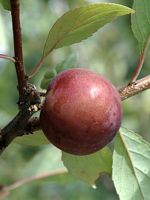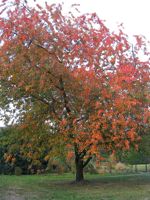Mon-Fri 9am - 5pm Mountain time
Black Cherry vs Opata Cherry Plum
Prunus besseyi x salicina Opata
Prunus serotina
NOT AVAILABLE THIS SEASON - MIGHT RETURN
Opata Cherry Plum is considered to be one of the best tasting Cherry Plum varieties. It has a pleasant, sweet flavour and a hint of acidity. They ripen in mid to late August and are well suited to fresh eating, baking, and preserves.
The fruit is closer to a plum than a cherry but is smaller than most plums.The Opata Cherry Plum’s skin is red/green whereas the flesh is yellow-green. The flesh is freestone with a juicy, firm texture. Similar to other stone fruits, it does not store for very long.
The Opata Cherry Plum is a hybrid between a Western Sand Cherry and a Japanese (Chinese) Plum. For fruit production, it needs to be planted with another variety for cross-pollination. Canada Plum and American Plum are considered universal pollinizers.
Black Cherry is common in eastern North America but a rare find elsewhere. This tree is shade tolerant and is often found in old fields, forest openings, and along fencerows.
The fruit is edible and is commonly used to flavor rum and brandy. It is also edible and often eaten fresh or used in wine or jelly. Black Cherry trees typically begin producing fruit when they are 10 years of age.
Black Cherry wood is a rich reddish-brown color and is strong, making it valued in cabinetry and woodworking. It is often used in reclamation as well.
The leaves can poison livestock as they contain cyanide derivatives and precursors. However, many have noted that deer still seem to browse their trees with impunity and birds and other animals eat the fruit when available.
Opata Cherry Plum Quick Facts
Black Cherry Quick Facts
Toxicity: bark and wilted leaves toxic to livestock

